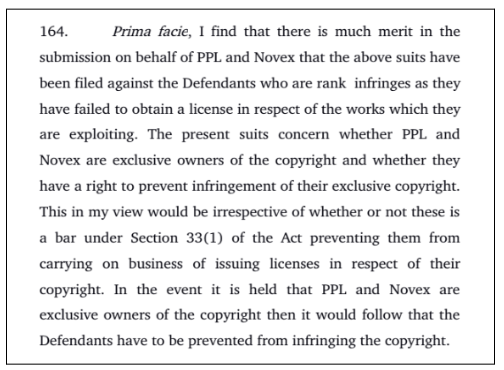In this edition of the Court judgements review, we look at the Allahabad HC’s ruling that the husband must provide maintenance to his wife even if he has no income but is physically able, Jharkhand HC’s comments that it is obligatory for wives to care for their elderly mothers-in-law or grandmothers-in-law, Karnataka HC’s ruling that additional motorcycle passenger beyond the permissible limit is liable for contributory negligence in an accident, and Supreme Court’s ruling that a person cannot be convicted based on suspicion.
Allahabad HC: Husband must provide maintenance to wife even if he has no income but is physically able
In Kamal vs. State of Uttar Pradesh, the petitioner had filed a revision plea before the Allahabad High Court challenging the order of the principal judge asking him to pay a monthly maintenance of Rs. 2,000 to his estranged wife. According to the facts, the couple got married in 2015. The wife left the matrimonial home over dowry demand and went to live with her parents.
The petitioner stated that he worked as a labourer. He added that he resided in a rented accommodation and took care of his dependent family. He also stated that he was severely ill and was undergoing treatment. He further contended that his wife, a graduate, earned enough to support herself. In contrast, his wife contended that she was forced to leave her marital home due to dowry-related cruelty. She argued that the husband owned agricultural land, had a factory job with a monthly salary of Rs.10,000, and generated an additional income from his business and agricultural land.
The Bench of Justice Renu Agarwal verified the medical documents and held that he was not seriously ill. The Court noted that the wife did not provide evidence that the husband earned income from some sources as she claimed. However, it held that there was clear proof of his good health and capability to earn, making him responsible for providing maintenance to his wife. The Court also pointed out that the revisionist didn’t present any proof during the trial that his wife was involved in adultery, which could impact her entitlement to maintenance. Referring to case from 2022 and dismissing the plea, the Bench stated that a husband, if physically able, is obligated to earn at least through physical labour and cannot evade his responsibility to provide financial support.
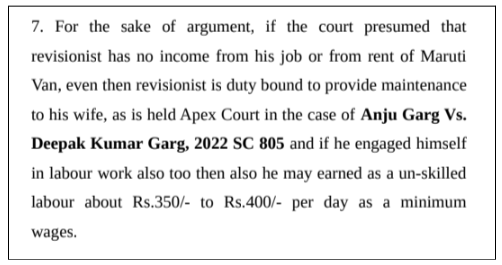
Jharkhand HC: It is obligatory for wives to care for their elderly mothers-in-law or grandmothers-in-law
In the case, Rudra Narayan Ray vs. Piyali Ray Chatterjee, the husband, filed a plea in Jharkhand High Court against a Family Court’s order that directed him to pay Rs. 30,000 per month to the wife and Rs. 15,000 per month to the minor son. He claimed that the lower court overlooked his wife’s behaviour. The couple was married in 2013, but issues arose over living with in-laws and alleged dowry demands. The wife left in June 2018, refusing to return. The husband sought judicial separation under Section 10 of the Hindu Marriage Act, citing the wife’s refusal to care for his elderly mother and grandmother.
The High Court deliberated on two matters. First, if the wife left the matrimonial home without valid cause, and second, whether the maintenance granted is disproportionate considering the husband’s income and liabilities.
Justice Subhash Chand found that the wife left willingly because she didn’t want to care for her elderly in-laws. She pressured her husband to live separately, which he resisted. Further, witnesses confirmed that there were no dowry demands. Citing Article 51 of the Constitution of India, the Bench emphasized that in Indian culture, it is customary for wives to care for their elderly mothers-in-law or grandmothers-in-law. The wife had an obligation to serve her husband’s mother and grandmother, and it was deemed unreasonable for her to demand to live separately from them and so she was not entitled to maintenance. It also quoted lines describing the role of woman in a family, from Yajurveda, Rigveda, Brihat Samhita and Manusmriti.
With respect to the minor son’s maintenance, the Court directed a raise from Rs. 15,000 to Rs. 25,000 per month considering the petitioner’s financial capacity. The petition was thus partly allowed.
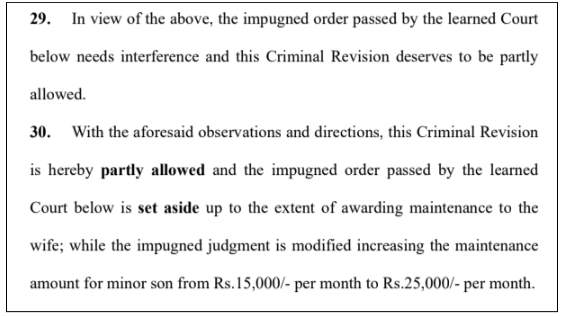
Karnataka HC: Additional motorcycle passenger is liable for contributory negligence in accident
The appellant in the case, ICICI Lombard Company Limited vs. Harshita and Another, filed the appeal in the Karnataka High Court against the judgment and award by the Motor Accident Claims Tribunal in an accident case. The occurrence of the accident and the injuries sustained by the claimant are undisputed. The questions to be addressed by the High Court were whether the claimant contributed to the accident through negligence and whether compensation for the loss of future income due to disability is justified. The Tribunal had awarded her a total compensation of Rs. 5.87 lakhs under various heads.
According to the insurance company, the medical report suggested that the claimant fell from the bike while riding. Additionally, they argued that even if the claimant is considered a pillion rider, the presence of three persons on the motorcycle led to a skid, and so the claimant, being aware of the situation, contributed to the risk, constituting contributory negligence. However, the claimant asserted that as a pillion rider, the claim is valid, supporting the Tribunal’s decision. They argue that the presence of three pillion riders doesn’t imply the claimant’s contributory negligence and urged the dismissal of the Insurance Company’s appeal.
Justice Hanchate Sanjeev Kumar of Karnataka High Court observed that police records confirmed four individuals on the motorcycle, including the claimant as a pillion rider. Acknowledging the claimant’s awareness of the situation, the Court held that she invited risk as a pillion rider. It also held that she was entitled to only 80% of the determined compensation amount as her negligence contributed to the remaining 20% in the accident. Further, the court ruled that the claimant is not eligible for compensation for the loss of future earnings due to disability since she was continuing in the same job with the same salary even after the accident.
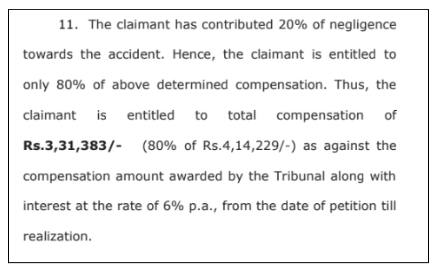
SC: A person cannot be convicted based on suspicion
Raja Naykar vs. State of Chhattisgarh is an appeal against the Bilaspur High Court’s decision in a murder case in 2015. In 2009, the accused committed murder by using a dagger on the deceased, wrapping the body in a blanket with others. The accused was convicted based on some evidence, like a dagger with potential bloodstains. However, it wasn’t conclusively proven that the blood was from the accused. The trial court relied on blanket pieces being similar to the accused’s. The High Court upheld the conviction, citing the accused’s lack of explanation. The accused challenged the conviction before the Supreme Court, arguing that it relied solely on suspicious recoveries without proving guilt beyond reasonable doubt.
The Bench of Justices B R Gavai and Sandeep Mehta held that suspicion, no matter how strong, is not enough to convict someone. To declare someone guilty, there must be solid proof beyond a reasonable doubt. On these grounds, the Bench re-examined the case. Noting that the only factor that might help the prosecution is finding the dagger based on information provided by the current appellant, the Bench observed that the said recovery is also from an open place accessible to one and all. Moreover, the blood discovered on the dagger did not match the blood group of the deceased. Merely finding a weapon with bloodstains was not enough for a conviction unless it is proven to be connected to the accused’s murder of the deceased, the Bench added.
Allowing the appeal, the Bench held that a person accused cannot be declared guilty based only on suspicion. It emphasized that there must be some additional evidence supporting the accusation to secure a conviction.
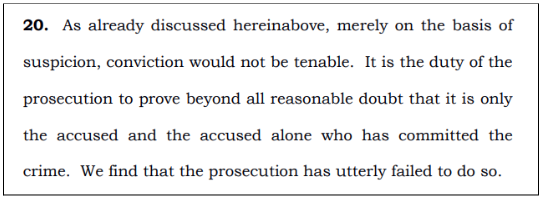
Bombay HC: Copyright assignees can issue music licenses without being registered copyright societies under Section 33(1) of the Copyright Act
The Bombay High Court heard a series of copyright infringement suits involving Novex Communications Private Limited and Phonographic Performance Limited as plaintiffs and passed the order in Novex Communications Pvt Ltd. vs. Trade Wings Hotels Limited. The two companies, PPL and Novex, are entities in India involved in managing the licensing and protection of sound recordings. They filed disputes to establish their status as exclusive copyright owners and to assert their right to prevent infringement of that copyright.
On the other hand, the defendants argued that the two companies were not authorized to conduct the business of licensing copyrighted works since they were not copyright societies. According to Section 33 of the Copyright Act, only copyright societies have the right to engage in licensing activities.
The Bombay High Court Bench of Justice R I Chagla observed that PPL and Novex as assignees/owners of copyright license their work under section 30 of the Act. Section 30 of the Act allows the owner of the copyright in any existing or future work to grant licenses. This means that the copyright owner has the legal authority to give permission or grant specific rights to others through a written license. The owner or their authorized agent can enter into a formal agreement outlining the terms and conditions under which others may use the copyrighted work.
The Bench held that the plaintiffs possess the authority to provide rights in the copyright through licensing under Section 30 of the Act, regardless of whether they are actively involved in the licensing business. Additionally, Section 33(1) of the Act does not prohibit an owner from conducting the business of licensing or collecting license fees.
